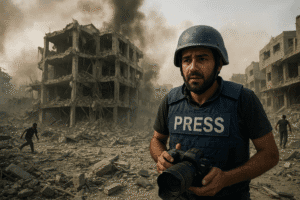Beyond the Headlines: When Journalism Becomes a Death Sentence in Gaza
Israeli forces deliberately slaughtered five Al Jazeera journalists in a targeted Gaza City drone strike, scattering notebooks and shrapnel where their press tent stood—a brazen attack condemned globally as a potential war crime and emblematic of Israel’s systematic silencing of Gaza’s witnesses. Amid global protests from Ramallah to Washington DC, personal tragedies unfolded, like 14-year-old Noor, who survived her family’s annihilation only because a sibling squabble diverted her sleeping spot the night missiles struck.
As former world leaders exposed Israeli authorities blocking life-saving aid at Gaza’s border, Australia took a landmark stance, recognizing Palestinian statehood in direct response to Netanyahu’s planned invasion of Gaza City and mass displacement of over a million civilians into southern “concentration zones.” With starvation weaponized and West Bank raids intensifying, the journalists’ assassination crystallizes Israel’s campaign to shroud Gaza’s suffering in darkness while the world fractures over Palestinian rights.

Beyond the Headlines: When Journalism Becomes a Death Sentence in Gaza
The rubble-strewn site of a journalists’ tent in Gaza City tells a story no words can fully capture. Scattered notebooks, a shattered camera lens, the ghostly imprint of where colleagues once worked – these are the remnants of an Israeli drone strike that deliberately killed five Al Jazeera journalists. Anas al-Sharif, Mohammed Qreiqeh, Ibrahim Zaher, Mohammed Noufal, and another staff member weren’t just reporting the news; they were the news, targeted for bearing witness. This assassination, condemned globally as a potential war crime, isn’t an anomaly. It’s the brutal punctuation mark on Israel’s systematic silencing of Gaza’s truth-tellers.
The Human Cost Echoes Globally:
- “The world’s silence gave my family only shrouds”: Yousef Aljamal’s grief is a searing indictment. His 14-year-old niece, Noor, became the sole survivor of her family when an Israeli strike hit their Gaza apartment. A sibling argument the night before – a mundane childhood moment – inadvertently saved her life. “My family would have preferred to celebrate the lives of their loved ones rather than just their memories,” he writes, highlighting the unbearable human calculus of survival in Gaza.
- Anas al-Sharif’s Haunting Legacy: His final message, released posthumously, wasn’t just a report; it was a testament. “I dedicate my voice to the people under the rubble,” he declared, embodying the journalist’s creed from the Jabalia refugee camp where he grew up. PEN America noted his Pulitzer-winning work and condemned the “disgraceful” smears attempting to justify his killing.
- Global Outrage Ignites: From Ramallah to Berlin, Tunis to Washington DC, protests erupted. Outside major US media headquarters, demonstrators like Hazami Barmada accused networks of “manufacturing consent” for Israel’s actions. “You are no longer the gatekeepers,” their message rang out – a public rejecting narratives that obscure atrocities.
Political Tremors and Blocked Aid:
- Australia’s Landmark Shift: Prime Minister Anthony Albanese cited Netanyahu’s relentless assault and plans for mass displacement as catalysts for recognizing Palestine. This move, welcomed by France (Macron), Qatar, and Saudi Arabia, signals a significant fracture in traditional Western backing for Israel. Former US Secretary Blinken’s criticism of the recognitions rings hollow against ongoing starvation and bombardment.
- The Cruelty of the Siege: Former world leaders Helen Clark and Mary Robinson witnessed the obscenity firsthand: “Massive quantities of food and medicines like ibuprofen ready for delivery… blocked by Israeli authorities” at Egypt’s border. This deliberate obstruction, amidst famine warnings, underscores the weaponization of aid.
- Internal Israeli Fractures: Defense Minister Katz publicly clashed with military chief Zamir over army promotions, exposing deep political-military rifts. The promotion of Col. Barak Hiram, controversially linked to the deaths of Israeli captives on Oct 7th, adds fuel to the fire.
Life Amidst the Rubble:
- “Concentration Zones” in the South: As Israel threatens a full-scale invasion of Gaza City, over a million displaced Palestinians face forced relocation to overcrowded, unsafe areas like Khan Younis’s al-Mawasi. Photos reveal families clinging to existence in burnt-out tents or the precarious shells of bombed buildings. An Israeli strike on tents in al-Mawasi killed five more Palestinians shortly after the journalists’ deaths.
- West Bank Crackdown Intensifies: Israeli raids, arrests, home demolitions, and checkpoint closures continued unabated across Hebron, Ramallah, and Tulkarem – a parallel campaign of repression amplifying Gaza’s suffering.
Why This Moment Demands More Than Condemnation:
The killing of these journalists is not just a tragedy; it’s a strategic assault on the world’s ability to see Gaza. It aims to shroud the realities of indiscriminate bombing, mass displacement, and manufactured famine in darkness. When shrapnel shreds a press tent and a child’s survival hinges on a sibling squabble, we move beyond statistics into the realm of profound human rupture.
The growing wave of international recognition for Palestine, the global protests fueled by shared outrage, and the relentless documentation by those still standing in Gaza are pushing back against the darkness. But words and recognitions must translate into tangible action: an immediate ceasefire, unimpeded humanitarian access, accountability for war crimes, and an end to the decades-long denial of Palestinian rights. The silenced voices of Anas al-Sharif and his colleagues demand nothing less. Their legacy isn’t just in the stories they filed, but in the global awakening their deaths must ignite.
You must be logged in to post a comment.